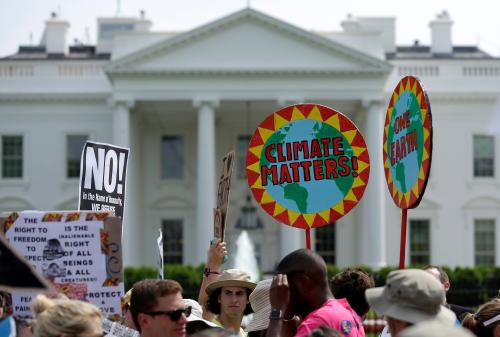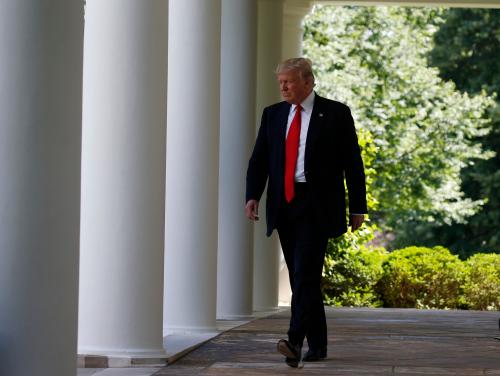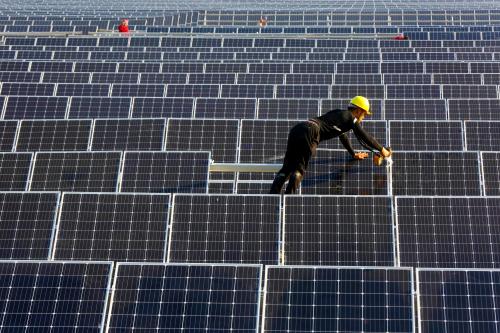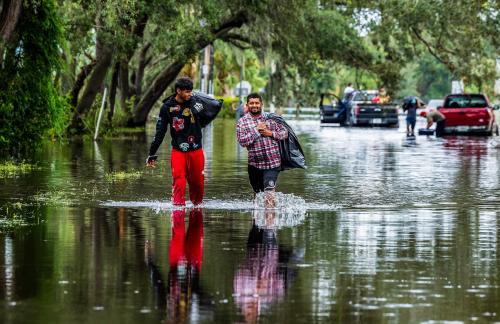In Trump’s June 2017 speech announcing his intent to leave the Paris accord, he disparaged it, saying it “punishes” the United States while imposing “no meaningful obligations” on major polluters, such as China and India, that will take advantage of the United States’ supposed sacrifice. Ever since, many Republicans have backed him up by crying foul that other countries got a better deal. Their argument is as false in 2019 as it was in 2017. It’s past time to put it to rest, argues Rick Duke. This piece was originally published by Foreign Policy.
The U.S. House of Representatives passed legislation this month aimed at preventing President Donald Trump’s withdrawal from the 2016 Paris climate accord and mandating that the United States develop a strategy to achieve the commitments it made under the agreement.
The Republican-controlled Senate is unlikely to give it the green light—and Trump could begin withdrawal procedures in November and formally withdraw from Paris a day after the 2020 election. All indications suggest that this is his goal. In Trump’s June 2017 speech announcing his intent to leave the accord, he disparaged it, saying it “punishes” the United States while imposing “no meaningful obligations” on major polluters, such as China and India, that will take advantage of the United States’ supposed sacrifice. Ever since, many Republicans, including Sen. Ted Cruz and Majority Leader Mitch McConnell, have backed him up by crying foul that other countries got a better deal.
The 2018 National Climate Assessment—a report written by 13 federal agencies—predicts that climate change could cost the United States hundreds of billions of dollars every year by the end of the century.
Their argument is as false in 2019 as it was in 2017. It’s past time to put it to rest.
Before the Paris agreement, the world had failed to reach a functional global agreement on climate change despite trying for decades. The reasons for this are complicated, but it essentially boils down to two issues. First, climate change presents a massive coordination problem. Every country has an economic incentive to underinvest in reducing emissions, which, like any investment, requires near-term expenditures for long-term gains—both domestic economic benefits such as reduced energy costs and improved air quality and global benefits from addressing climate change. Such free-riding countries hope that others will collectively do enough to contain global warming.
Second, even if all act together, countries disagree on which should cover more of the upfront investments to transition the world toward a more sustainable economy. That’s because developed countries are mostly responsible for global warming to date, but emerging economies will account for the majority of future emissions as they modernize. This is why the Paris agreement was designed to avoid placing onerous obligations on any country, including the United States, or to punish any country that signed on.
To solve the first problem, the agreement prioritized bringing all countries into the tent as a step toward genuine coordinated action. It did so by requiring two major commitments from all signatories: defining a “nationally determined contribution,” or emissions reduction target, every five years and agreeing to mandatory transparency measures so the world could assess if a country fulfilled its promise.
To mitigate the upfront investment allocation problem, the agreement let countries determine their contributions based on their circumstances. It urged them to be ambitious, but required nothing specifically, and levies no tangible punishments for countries falling short as long as they report their progress. To help developing countries take on more ambitious targets that help everyone, the Paris agreement set up a Green Climate Fund to help facilitate “investment in low-emission and climate-resilient development,” which developed countries, including the United States, agreed to capitalize.
So why does Trump believe the Paris agreement is “very unfair” to the United States? The crux of his argument is that other countries, especially China and India, can take advantage of U.S. actions.
Trump points out that China is permitted to grow its emissions until 2030, and that India demanded “billions and billions and billions” of dollars to enter the deal, while the United States gets nothing.
It is true that China has committed to peak its emissions around 2030, but it has also committed to lower the carbon intensity of its economy to 60-65 percent below its 2005 level and to more than double the share of carbon-free energy in its entire economy over the same time period. This will require China to make massive investments in clean energy, and the country is already delivering, tracking to 50 percent clean power by 2030 based mainly on torrid expansion of wind and solar. India has also committed to reduce the emissions intensity of its economy by 33-35 percent below 2005 levels over the same period, and it is also acting seriously, including installing renewables at a furious pace. And Mexico, the United States’ neighbor and close trading partner, pledged to peak its emissions by 2026. By comparison, the United States promised to reduce emissions to 26-28 percent below 2005 levels by 2025.
In March, the U.S. Air Force requested $5 billion to repair damage done by weather to just two bases over the past six months.
All of these commitments are ambitious, all help everyone in the world by containing climate impacts and driving down the cost of carbon-free technologies through scale and learning by doing, and none could have been achieved except through the Paris agreement.
But what about the Green Climate Fund, where “billions and billions” of American aid would go to pay other countries to reduce emissions? When Trump entered office, the United States owed $2 billion of the $3 billion it had promised to the fund. That’s less than a quarter of the money the president has sought to divert from other sources to build his wall on the U.S.-Mexico border.
More importantly, this money is a drop in the bucket of the costs of climate change, including climate-fueled severe weather. In March, the U.S. Air Force requested $5 billion to repair damage done by weather to just two bases over the past six months. The civilian damage runs greater still: California’s wildfires last year caused $9 billion in damage. Worse, the 2018 National Climate Assessment—a report written by 13 federal agencies—predicts that climate change could cost the United States hundreds of billions of dollars every year by the end of the century. Faced with these facts, any competent dealmaker would invest $2 billion if it secured climate commitments and propelled the world’s leading polluters to tackle the challenge head on.
The great irony of Trump’s promise to withdraw from the Paris accord is that this step would actually create the problem he falsely attributes to the agreement.
By making the United States the ultimate climate action free-rider, Trump’s withdrawal would provide serious cover for major emitters like China and India, slackening their efforts to cut pollution while allowing them to continue to claim to lead the world on climate change in the United States’ absence.
It’s more ironic still that, after years of denying climate change, Trump and many Republicans are arguing that the reason the United states should not stay in the Paris agreement is because other countries are not doing enough to confront the challenge, even as Washington remains unwilling to commit to taking serious steps at home to reduce U.S. carbon pollution.
The great irony of Trump’s promise to withdraw from the Paris accord is that this step would actually create the problem he falsely attributes to the agreement.
Luckily, the world already has a flexible, transparency-based agreement that encourages all countries to take ambitious actions to counter climate change. It’s called the Paris agreement. It represents the first-ever worldwide accord on a pragmatic path to tackle climate change, and the United States under President Barack Obama led the charge. That is why Trump’s threat to withdraw from the agreement, if he follows through, would be a self-inflicted wound that punished all countries—none more than the United States.
The Brookings Institution is committed to quality, independence, and impact.
We are supported by a diverse array of funders. In line with our values and policies, each Brookings publication represents the sole views of its author(s).







Commentary
Op-edLeaving the Paris Agreement is a bad deal for the United States
Trump’s plan to quit the accord would provide serious cover for major emitters like China and India
May 19, 2019